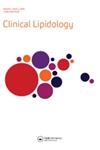脂质和脂蛋白在心肌生物学和心力衰竭发展中的作用
Q Medicine
引用次数: 6
摘要
随着人口老龄化,心力衰竭将继续成为一个日益严重的公共卫生问题。心脏的代谢稳态需要对不同底物的代谢进行微调。尽管对脂肪酸和葡萄糖的利用进行了反向控制,但心脏在同时氧化这两种底物时功能最好。长链脂肪酸在心肌中的摄取和氧化不匹配会诱发脂肪毒性,其特征是甘油三酯、二酰基甘油、神经酰胺和其他脂质的积累。脂肪毒性可导致心肌细胞凋亡、间质纤维化和心功能障碍,并可促进胰岛素抵抗。在这篇综述中,我们将重点介绍脂质和脂蛋白对心肌生物学和心力衰竭发展的影响,而不是它们对冠心病的影响。本文章由计算机程序翻译,如有差异,请以英文原文为准。
Role of lipids and lipoproteins in myocardial biology and in the development of heart failure
Abstract As the population ages, heart failure will continue to be a growing public health problem. Metabolic homeostasis in the heart requires a fine-tuning of metabolism of different substrates. Notwithstanding a retro control of fatty acid and glucose utilization, the heart functions best when it oxidizes both substrates simultaneously. Mismatch between the uptake and oxidation of long-chain fatty acids in the myocardium induces lipotoxicity characterized by the accumulation of triglycerides, diacylglycerols, ceramides and other lipids. Lipotoxicity may result in cardiomyocyte apoptosis, interstitial fibrosis and cardiac dysfunction, and may promote insulin resistance. In this review, we will highlight the impact of lipids and lipoproteins on myocardial biology and on the development of heart failure independent of their effects on coronary heart disease.
求助全文
通过发布文献求助,成功后即可免费获取论文全文。
去求助
来源期刊

Clinical Lipidology
生物-生化与分子生物学
CiteScore
0.44
自引率
0.00%
发文量
0
审稿时长
6-12 weeks
期刊介绍:
The Journal of Clinical Lipidology is published to support the diverse array of medical professionals who work to reduce the incidence of morbidity and mortality from dyslipidemia and associated disorders of lipid metabolism. The Journal''s readership encompasses a broad cross-section of the medical community, including cardiologists, endocrinologists, and primary care physicians, as well as those involved in the treatment of such disorders as diabetes, hypertension, and obesity. The Journal also addresses allied health professionals who treat the patient base described above, such as pharmacists, nurse practitioners and dietitians. Because the scope of clinical lipidology is broad, the topics addressed by the Journal are equally diverse. Typical articles explore lipidology as it is practiced in the treatment setting, recent developments in pharmacological research, reports of treatment and trials, case studies, the impact of lifestyle modification, and similar academic material of interest to the practitioner. While preference is given to material of immediate practical concern, the science that underpins lipidology is forwarded by expert contributors so that evidence-based approaches to reducing cardiovascular and coronary heart disease can be made immediately available to our readers. Sections of the Journal will address pioneering studies and the clinicians who conduct them, case studies, ethical standards and conduct, professional guidance such as ATP and NCEP, editorial commentary, letters from readers, National Lipid Association (NLA) news and upcoming event information, as well as abstracts from the NLA annual scientific sessions and the scientific forums held by its chapters, when appropriate.
 求助内容:
求助内容: 应助结果提醒方式:
应助结果提醒方式:


